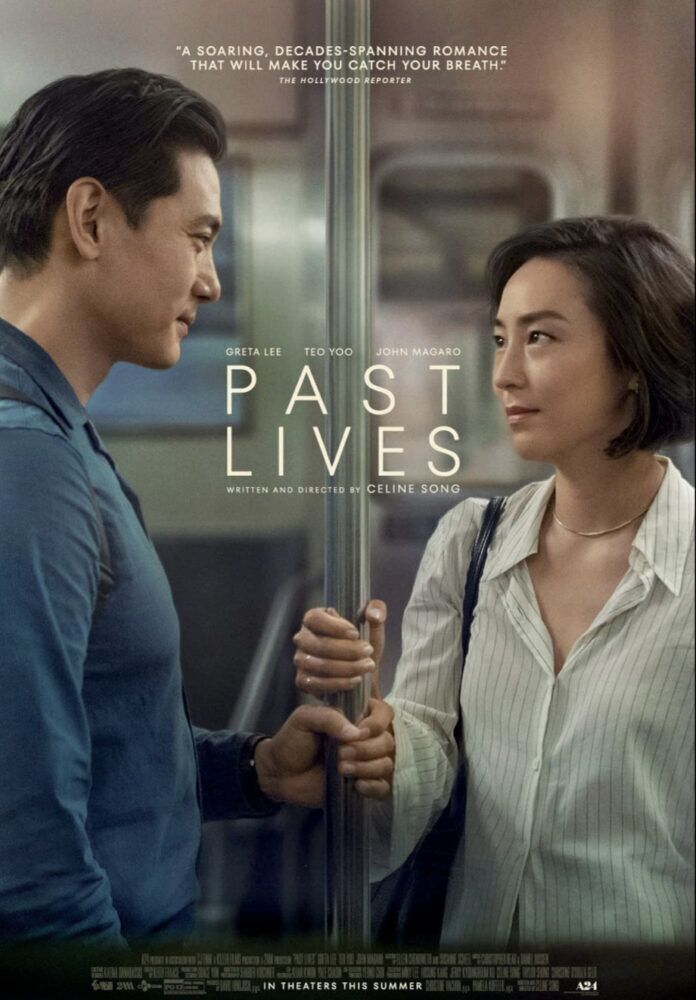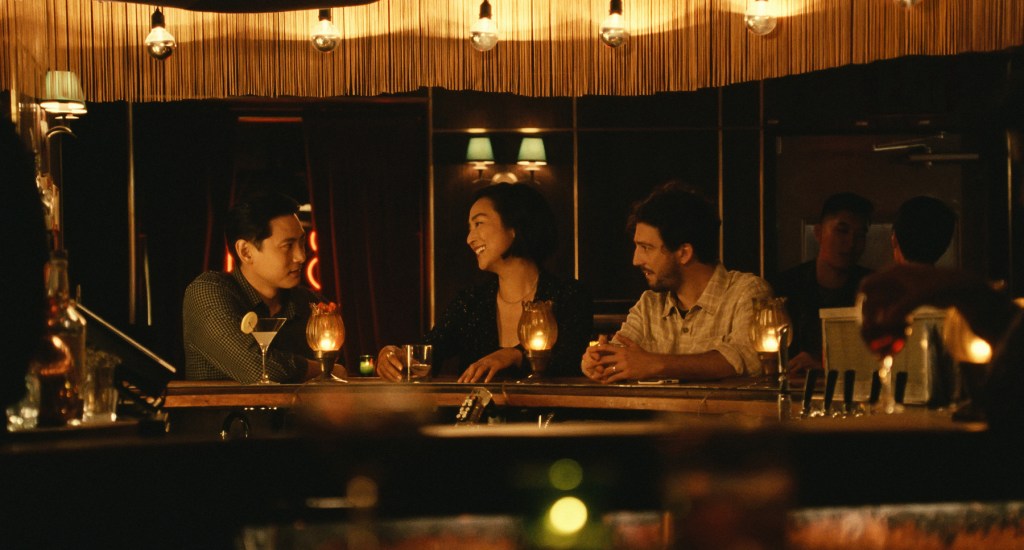
Is love a matter of free will or destiny? Filmmaker Celine Song explores this archaic question through the philosophical concept on In-Yun. This Korean word is explained by a very evocative image: “If two strangers walk by each other and their clothes brush, there must have been something between them in their past lives. In-Yun is about relationships between people and it extends past one lifetime. It’s actually asking: What’s possible? Is it just timing, or is it something greater than that?” In-Yun is what leads the way through the film Past Lives.
Na-young (Greta Lee) and Hae Sung (Teo Yoo) are childhood friends, with romantic feelings. When the young girl is 12 years old, with her parents and sister, she emigrates from South Korea to Canada and later to the U.S. In the Western hemisphere Na-young blossoms into Nora Moon, an ambitious intellectual whose childhood dream of winning a Nobel Prize, morphs into the aspiration for a Pulitzer and Tony Award. Nora and Hae Sung gradually mould their identities and lifestyles according to the countries they live in. Eventually they reconnect in their twenties, via Skype and Facebook. Their rekindled conversation confronts a halt, until they revive their friendship during their mid-thirties. At this point, Nora is an accomplished playwright and married to fellow writer Arthur (John Magaro). Hae Sung is an engineer in Korea, and decides to travel to New York to visit his childhood friend. The love triangle that emerges goes beyond conventions, as Nora does not hid anything to either Arthur or Hae Sung and the two men are very compassionate towards each other. “The guy flew 13 hours to be here. I’m not going to tell you that you can’t see him,” Arthur says and adds “What a good story this is. Childhood sweethearts who reconnect 20 years later only to realise they were meant for each other. In the story I would be the evil white American husband standing in the way of destiny.” Whilst Hae Sung after meeting Arthur, tells Nora: “I didn’t know that liking your husband would hurt this much.”

The blurred roles of the three emotional parties involved is epitomised by the opening sequence, where Nora, Arthur, and Hae Sung sit together in a bar. We can’t hear what they’re saying, but we hear the voiceover of other customers speculating about the relationship between these three individuals. Later on, the film returns to that scene, where we are well aware about the identity and role of each individual that forms the trio. This instant is partly autobiographical for the South Korean-Canadian filmmaker, who found herself sitting between her white American husband and her Korean childhood sweetheart. Just like Nora, Celine Song has a mother who is an artist, a father who is a filmmaker; she moved from South Korea to Canada when she was twelve years old and eventually ended up in New York City. Other than this premise the narrative encapsulated in Past Lives is fictional. It is exceptionally shaped to juxtapose the way we are influenced by our environment and the role destiny can play in our existences.
Past Lives delves deep into the nature of being, also through the exploration of what it means to be a migrant. Nora while chatting with her husband makes a distinction between ‘Korean-Korean’ and ‘American-Korean,’ which stands as a universal reflection for all immigrants. This reflection expands on cross-cultural philosophy, that coincidentally has been thoroughly studied by an emeritus professor of political science at an American University who was born in a small village at the foothills of the majestic Mount Chiri, in South Korea: Hwa Yol Jung. The object of study of this contemporary philosopher is precisely challenging the conventional border between the East and the West, in the age of globalisation, demonstrating the possibility of cross-cultural philosophical thinking. He advocates for Cosmopolitanism, that demands humans to transcend the man-made boundaries of national identity, cultural differences, and regional values for the common cause of promoting the benefit of humans, based on the fact that we are all human.

Professor Hwa Yol Jung has also conceived ‘transversality’ or ‘trans(uni)versality,’ as a model that should substitute the cultural assimilation of the melting-pot, as much as the separatism of multiculturalism. We need to aspire to a unity-in-diversity, that englobes intersections of different outlooks.
Celine Song seems to visually convey this idea through the driving force of Past Lives, i.e. In-Yun. What would have happened to Nora and Hae Sung had she not left Korea? Staying would have meant denying her true nature, and perhaps suppressed the charm that fascinated Hae Sung. What made the two potential lovers drift apart seems to be the very element that acts like an emotional magnet. Nora underlines the Korean traits of Hae Sung, whilst he is in awe of her worldly spirit.
In-Yun is presented to us in its making, since Hae Sung at one point wonders “What if this is a past life as well, and we are already something else to each other in our next life?” The process is an endless loop, and Past Lives exposes how the capacity for love is boundless.
If ontology investigates into the nature of reality and epistemology focuses on what generates knowledge, Celine Song has brought to life a cinematic work about the ontology of love, choosing In-Yun as its epistemology.
Final Grade: A

